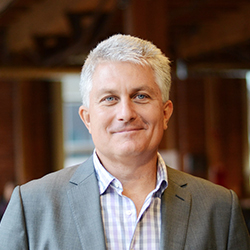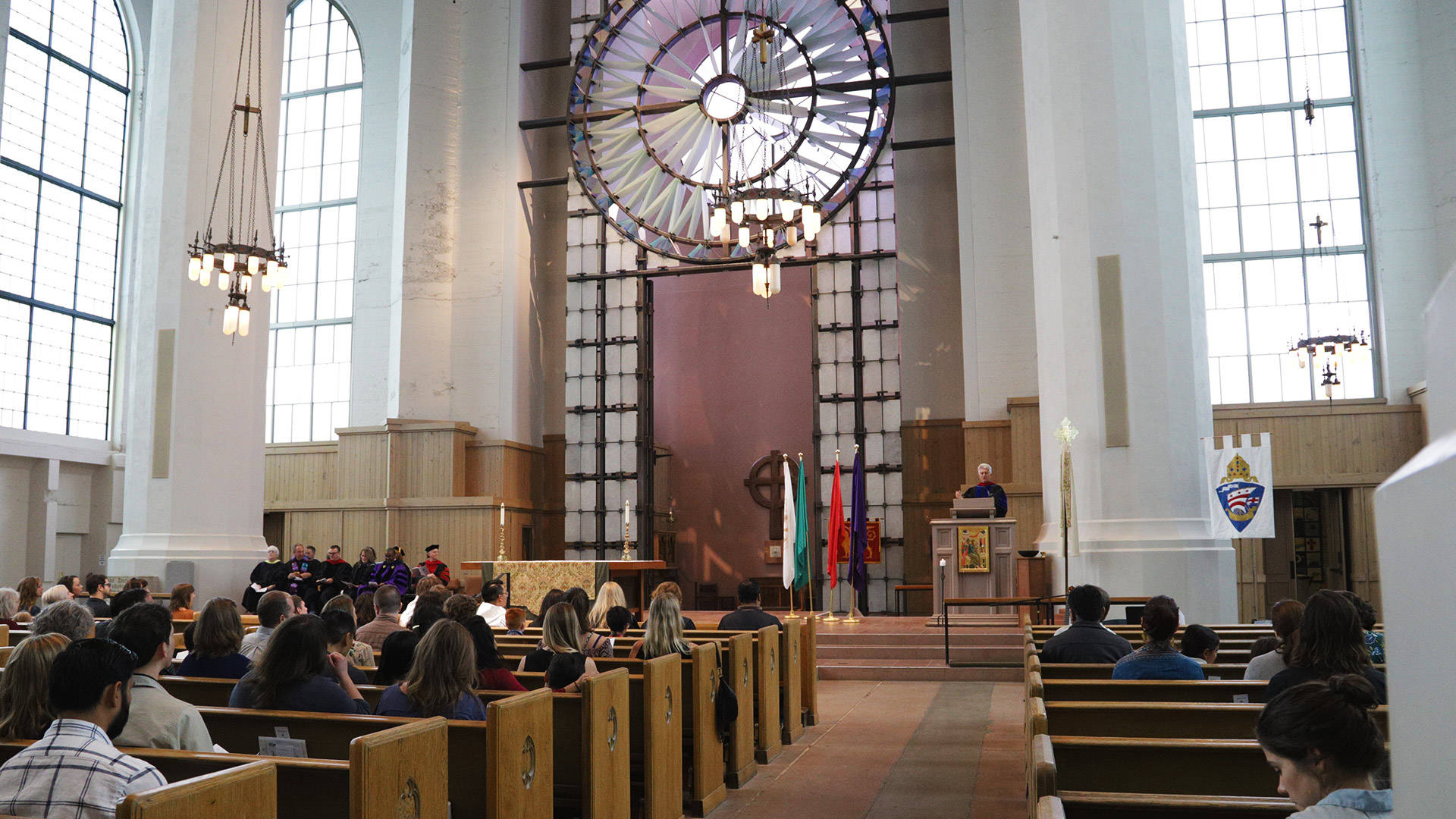Each year, Convocation at St. Mark’s is the sacred culmination of our Orientation,(Re)Orientation, and Community Weekend events. Alumni, faculty, staff, and returning students gather to commit themselves to a new year together, formally welcoming new students into our learning community with liturgy, prayer, and song. A central part of Convocation is the Presidential address orienting us to a new year and reconnecting us to the founding mission of The Seattle School. Below is the full text of this year’s address from Dr. Craig Detweiler.
To our new cohort, welcome to The Seattle School. And welcome back to such a compelling cloud of alumni ushering this next generation into our learning community. This is our 21st year. We’re growing up. Maturing. Deepening our roots. Happy Birthday to us!
I’m new here, recently uprooted. So, this is my first Convocation. If you’re nervous and uncertain about what lies ahead, welcome to my world. Who uprooted from family or friends to join us? Locals: seek them out. Show them that the Seattle freeze can be melted with a smile, a hug, a sympathetic ear.
This school was founded by a faithful few who left their respective institutions on a trek to name our traumas and forge a more integrative education. Rebels with a cause. To celebrate that journey, 20 years of twists and turns, we need your help. Faculty, staff, and grads, we want to hear your stories throughout this school year. What has inspired you, sustained you? What brings you back to Convocation today? Or to Symposia in October?
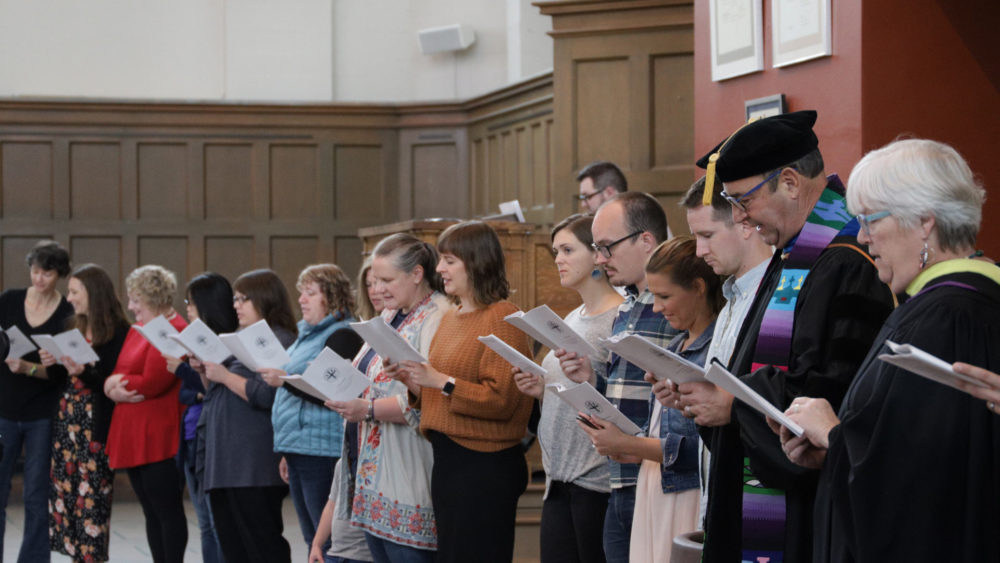 I was attracted to The Seattle School’s bold commitment to Christ and to exploring our stories, even when it hurts. We may have been drawn here due to bad religion, united by our aches and pain. Years ago, a group of students founded our academic publication, The Other Journal, as a way of affirming and embracing the Other. We band together out of brokenness. Hopefully, we graduate as wounded healers, able to hold tensions, to stand in the gap, eager to build bridges rather than walls.
I was attracted to The Seattle School’s bold commitment to Christ and to exploring our stories, even when it hurts. We may have been drawn here due to bad religion, united by our aches and pain. Years ago, a group of students founded our academic publication, The Other Journal, as a way of affirming and embracing the Other. We band together out of brokenness. Hopefully, we graduate as wounded healers, able to hold tensions, to stand in the gap, eager to build bridges rather than walls.
At The Seattle School, we practice a third way, rooted in the relationality of the Holy Trinity. We orient ourselves around three key words, text.soul.culture, rooted in the three scriptural texts that were read by our esteemed faculty this morning. Why did our founders deem these passages as especially foundational? One of the reasons I knew this was the place for me, is that these verses have inspired and sustained me over the years. When the Board of Trustees asked what these three pericopes meant to me, these were my answers:
Psalm 19 is the starting point for every class I teach on theology and pop culture because of how it connects creation, revelation, and the Word of God. It is about epistemology—two sources of knowledge. The first six verses of Psalm 19 elucidate how Elohim chose to communicate via creation. This is natural theology, a call to open our eyes and ears, to develop a sacred way of seeing and reading the text of life, our surroundings.
In verses 7-12, the Psalmist shifts towards the text of Scripture, Yahweh’s law. It is described as precious, golden, sweet, reviving the soul. This Psalm could be read as a progression, from general revelation in nature towards the special revelation of the Torah. But we understand the Hebrew Scriptures as advocating a both/and approach to faith rather than an either/or hierarchy. From the foundation of the world, God has been communicating to us in multiple ways, from the elusive Elohim to the fiery Yahweh, revealing a profound love and hunger for relationship.
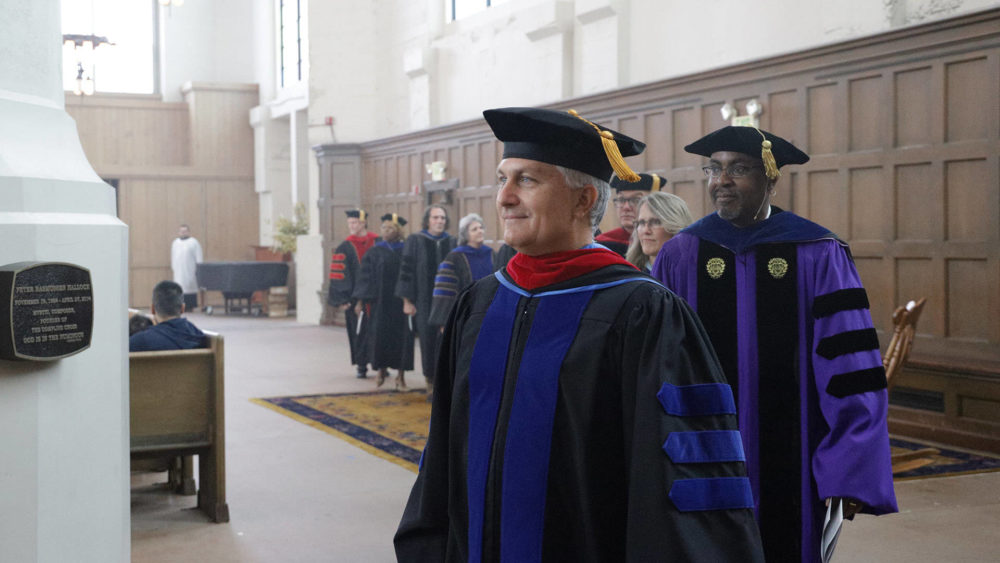
Colossians 1 is a seminal statement on the preeminence of Christ from creation through salvation. I love the all-encompassing majesty of this vision of Jesus. Like Psalm 19, it is cosmic in scope and scale. Colossians’ emphasis upon Jesus as the image of the invisible God tells us so much about who we are and what love looks like. This is the root of theological anthropology, the soul of our institution. The primacy of Jesus as the glory of God in human form is the starting point for our incarnational education—being present and available to God and to each other. We are transformed by an embodied savior overflowing with generativity. Jesus reveals our calling as the self-images of God. In other words, we are God’s selfies. So how do we reflect that? Thanks to Jesus’ reconciling work on the cross, we are invited to join as participants, actors in a dramatic, celestial love story.
The Apostle Paul’s proclamation at the Aeropagus in Greece—a.k.a. Mars Hill—is the core text for so much cross-cultural communication. It invites us to take note of where we are, to consider our context. In Acts 17, Paul affirms how the Spirit of God has moved amongst people who may not have a particular name for God. They are seeking and searching for answers and expressing their nascent faith and longing in artistic ways. You might be in a similar place. Amidst the marketplace of ideas on Mars Hill, Paul affirms the Athenians’ cultural expressions. He comes alongside the conversation they’re already having, explaining the ways of God in terms they recognize. Paul affirms their lived wisdom, quoting from their poets, the top 40 of their day, and calls them to focus their worship upon the living God, revealed in Christ. He reverses the cultural hermeneutic, taking the Greeks from their philosophy into a vibrant theology. Paul is an active student of his culture and times, bringing a timeless message into a particular place. Surely, this is our mission and calling today. To demonstrate the proximity of God, the closeness of Christ, the Wild Goose that is the Spirit on the loose.
So where are we? To those who say Seattle is not very religious, I would say, “Look around.” What do you notice in this space? Pretty nice digs here at St. Mark’s Cathedral. And when you step outside, what do you see? A rigorous commitment to creation care, a heart for orcas, a love for the forests, foraging for the finest ingredients—what respect for creation, and maybe the Creator. Seattle also overflows with art, music, creativity, and craft beer. How might we come alongside these thoughtful expressions with a faithful presence? In this artisanal city, we offer a hand-crafted education. A unique vintage and aroma for each small batch of graduates.
The true test of our education comes not just from what it does for us, but how it tastes to others. How are we contributing to our surroundings? We seek the welfare of Seattle, from the unhoused living on the streets to those trapped in Amazon’s towers. Our alumni are counseling Muslim refugees and our faculty are serving migrants up north in Mount Vernon. We also must connect the dots between systems and cultures. I recently heard from a city official, a graduate of our school, about how the arrival of lonely computer programmers from around the globe has resulted in a rise in human trafficking. And what about gentrification and displacement of longstanding citizens to more affordable environs south of the city? How do we make our education and training more accessible from Olympia to Everett, Hong Kong to Houston? An understanding of economics and demographics is essential to live out our psychological and theological callings.
“An understanding of economics and demographics is essential to live out our psychological and theological callings.”
We may not agree on how to address the wicked problems confronting us in this divisive era. It is easy to feel overwhelmed, riddled with despair. Some may turn to the text, others will probe the soul, a third of us may concentrate upon the arts to process our grief. We all need profound spiritual resources to endure the world of pain that unspools before us. The education you embark upon may feel like a lonely road. But these wise teachers and faithful alums are roots you can tap into. We urge you to bring the text of life alongside the text of Scripture in order to feed your soul and enrich the culture.
As we prepare to gather around this table for the Eucharist, we are reminded how primary relationships remain, both interpersonal and communal. May we remain committed to each other as followers of Jesus, despite the differences in our worship practices or our understanding of sexuality, justice, or scripture. May The Seattle School of Theology & Psychology continue to translate robust beliefs into healthy and sustainable practices of agape in action.
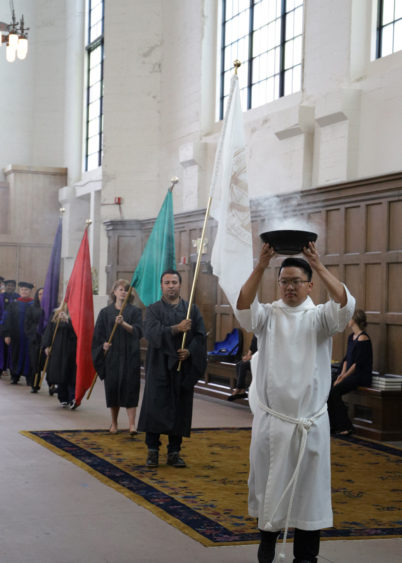 We are about to recite the Nicene Creed. It arose from a time of division and confusion. It was forged via prayer, negotiation, and nuance. This Creed offers roots amidst the arguments we will continue to have about how to put our convictions into practice. Its Trinitarian structure reminds us whose we are, who we are, and where we are. By starting with God’s creative act and our calling as imago Dei, we proceed with confidence. By centering our identity in the incarnation, crucifixion, and resurrection of Christ, we have a tangible way out of the sin that bedevils us. Openness to the purifying and renewing work of the Spirit allows us to walk with confidence rather than fear. As we partake of the body and blood of Jesus, we can confess our shortcomings, both personal and corporate, with a humility that reminds us we are reformed and ever reforming.
We are about to recite the Nicene Creed. It arose from a time of division and confusion. It was forged via prayer, negotiation, and nuance. This Creed offers roots amidst the arguments we will continue to have about how to put our convictions into practice. Its Trinitarian structure reminds us whose we are, who we are, and where we are. By starting with God’s creative act and our calling as imago Dei, we proceed with confidence. By centering our identity in the incarnation, crucifixion, and resurrection of Christ, we have a tangible way out of the sin that bedevils us. Openness to the purifying and renewing work of the Spirit allows us to walk with confidence rather than fear. As we partake of the body and blood of Jesus, we can confess our shortcomings, both personal and corporate, with a humility that reminds us we are reformed and ever reforming.
Scandals within our churches and institutions offer much to repent of and lament over. At a time when misrepresentations of faith may cause us to weep and mourn, we proceed with a generous Orthodoxy that must not be co-opted for political purposes. The Nicene Creed roots us. Our mystic sweet communion unites us. May we major on these three majors—Creator God, Sacrificial Savior, Sustaining Spirit. Amen.

